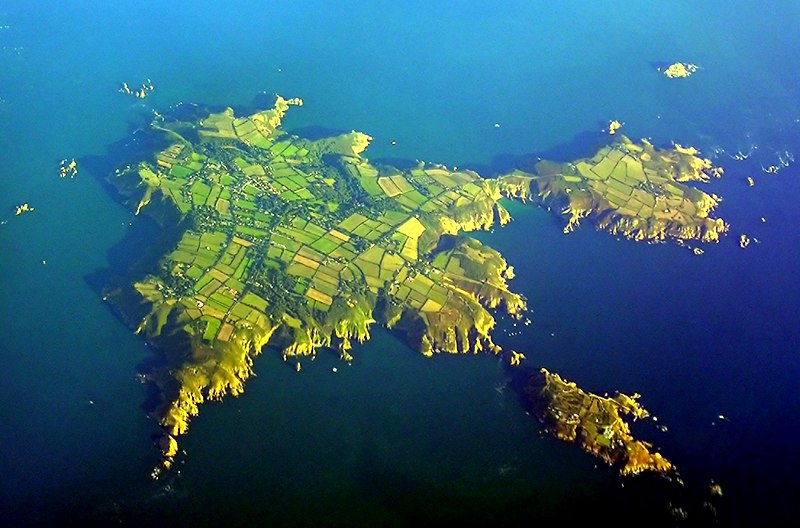It's kind of sad in a way; the people of Sark liked their ancient feudal system so much that they twice rejected EU orders to change it since 2000. So much for one of the last hold outs of the medieval system.
Sark agrees switch to democracy
Politicians in the Channel Island of Sark have agreed to end the island's feudal system of government which has been in place for the past 450 years.
Governing body, the Chief Pleas, has approved new reform laws which will lead to the introduction of a 28-member elected chamber.
Elections under the new constitution will be held in December.
Sark, 80 miles off the south coast, had been governed by a mix of landowners and elected people's deputies.
'Great relief'
There was pressure on Sark to reform its feudal constitution to comply with the European Human Rights laws and other international obligations.
Owners of the island's 40 tenements (divisions of land) currently have an automatic seat in the Chief Pleas, and islanders chose 12 people's deputies.
The first new assembly of Chief Pleas will take place in January next year.
Deputy Paul Armorgie said: "It's a great relief.
"We have been trying to achieve this for 10 years and now a line has been drawn.
"Sark is finally moving from feudalism to democracy."
In its day, Sark had a very democratic system. The settlers ran the island
Seneshal Lt Col Reg Guille
Sark, which is only 3 miles (4.8km) long and 1.5 miles (2.4k) wide, has a resident population of about 600.
Its government can directly trace its roots back to Queen Elizabeth I, who once granted the ruling "Seigner" a fief on the tiny Channel Island.
The unelected descendents of 40 families brought in to colonise Sark, after the French abandoned it in 1553, have governed life on the island ever since.
But its feudal system of government started coming under pressure in 2000 in the light of human rights laws.
Two proposals for reform were rejected in 2005 and 2007 until Thursday night's historic agreement.
Mr Armogie said: "Ten years ago the mood on the island was that no change was wanted.
"But Sark had to face up to its international obligations and it became clear that Sark had to move on."
"It is the passing of an era."
'Very successful'
Seneshal Lt Col Reg Guille, who acts as a presiding officer of the Chief Pleas, said the original settlers of the island would be "horrified" at the change.
He said: "The system of government has proven for our small community to be a very successful way to manage our own affairs.
"They (the original settlers) would not understand our modern democracy.
"In its day, Sark had a very democratic system. The settlers ran the island."
A spokesman for the Ministry of Justice said: "Sark is seeking to reform its feudal constitution in order to make it comply with the European Convention on Human Rights and other international obligations.
"The UK is responsible for ensuring that Sark's constitution meets those requirements and the UK is vulnerable to challenge if it does not."
Politicians in the Channel Island of Sark have agreed to end the island's feudal system of government which has been in place for the past 450 years.
Governing body, the Chief Pleas, has approved new reform laws which will lead to the introduction of a 28-member elected chamber.
Elections under the new constitution will be held in December.
Sark, 80 miles off the south coast, had been governed by a mix of landowners and elected people's deputies.
'Great relief'
There was pressure on Sark to reform its feudal constitution to comply with the European Human Rights laws and other international obligations.
Owners of the island's 40 tenements (divisions of land) currently have an automatic seat in the Chief Pleas, and islanders chose 12 people's deputies.
The first new assembly of Chief Pleas will take place in January next year.
Deputy Paul Armorgie said: "It's a great relief.
"We have been trying to achieve this for 10 years and now a line has been drawn.
"Sark is finally moving from feudalism to democracy."
In its day, Sark had a very democratic system. The settlers ran the island
Seneshal Lt Col Reg Guille
Sark, which is only 3 miles (4.8km) long and 1.5 miles (2.4k) wide, has a resident population of about 600.
Its government can directly trace its roots back to Queen Elizabeth I, who once granted the ruling "Seigner" a fief on the tiny Channel Island.
The unelected descendents of 40 families brought in to colonise Sark, after the French abandoned it in 1553, have governed life on the island ever since.
But its feudal system of government started coming under pressure in 2000 in the light of human rights laws.
Two proposals for reform were rejected in 2005 and 2007 until Thursday night's historic agreement.
Mr Armogie said: "Ten years ago the mood on the island was that no change was wanted.
"But Sark had to face up to its international obligations and it became clear that Sark had to move on."
"It is the passing of an era."
'Very successful'
Seneshal Lt Col Reg Guille, who acts as a presiding officer of the Chief Pleas, said the original settlers of the island would be "horrified" at the change.
He said: "The system of government has proven for our small community to be a very successful way to manage our own affairs.
"They (the original settlers) would not understand our modern democracy.
"In its day, Sark had a very democratic system. The settlers ran the island."
A spokesman for the Ministry of Justice said: "Sark is seeking to reform its feudal constitution in order to make it comply with the European Convention on Human Rights and other international obligations.
"The UK is responsible for ensuring that Sark's constitution meets those requirements and the UK is vulnerable to challenge if it does not."




Comment